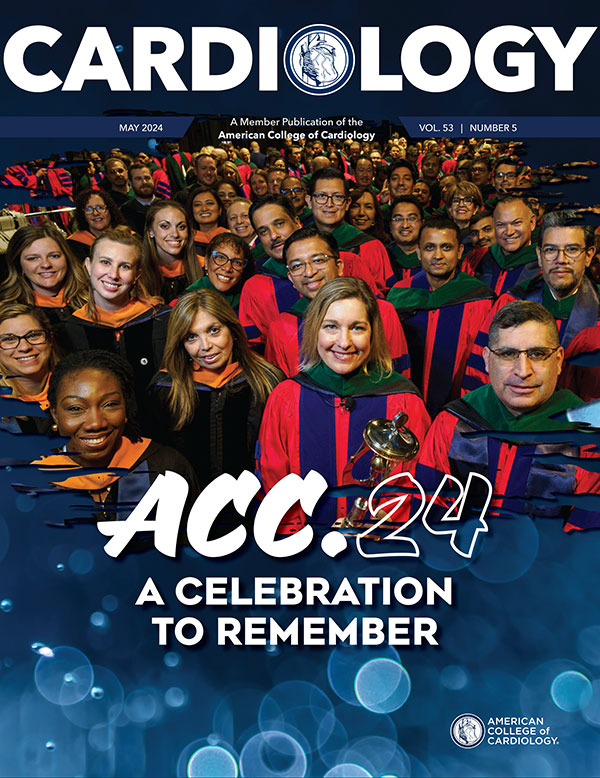Prioritizing Health | ACC.24 Research in the Consumer News
Research from ACC.24 also finds its way to patients and the general public. Here's a roundup of some of these key studies making headlines in major news outlets.


E-Cigarette Use Increases HF Risk: A 19% higher risk of developing heart failure (HF) was found among users of e-cigarettes, vs. nonusers in a prospective observational study. Over the median 45-month follow-up, 3,242 of 175,667 participants (average age 52 years, 60.5% women) developed HF. The increased risk was statistically significant for HF with preserved ejection fraction (HFpEF) but not for HF with reduced ejection fraction (HFrEF). "I think this research is long overdue, especially considering how much e-cigarettes have gained traction," said lead author Yakubu Bene-Alhasan, MD. Surveys indicate about 5% to 10% of U.S. teens and adults use e-cigarettes.

More Greenspace, Better Heart Health: People living in areas with more sidewalks were 9% less likely to suffer a major adverse cardiovascular event than those who did not, and participants living in neighborhoods with vertical green space – trees and clear sky – were 5% less likely, over a 27-month follow-up. The study authors found no significant association with horizontal greenspace (grass). "A lot of research has shown that environmental factors strongly affect our health," said lead author Zhuo Chen, PhD. "If we can find a way to stratify this risk and provide interventions before cardiovascular events happen, then we could save a lot of lives."

Eggs and CVD Risk: At four months, no difference was found in cholesterol levels between participants who ate ≥12 fortified eggs per week and those who ate fewer than two eggs, in a prospective, randomized, study with 140 patients (≥50 years, average age 66 years, 50% women, 27% Black) who had either experienced one cardiovascular event or had two cardiovascular risk factors. The 0.64 mg/dL reduction in HDL-C and 3.14 mg/dL in LDL-C found in the fortified egg group was not significant compared with the non-egg group. "While this is a neutral study, we did not observe adverse effects on biomarkers of cardiovascular health and there were signals of potential benefits of eating fortified eggs that warrant further investigation in larger studies as they are more hypothesis generating here," said Nina Nouhravesh, MD, the study's lead author.

Nearby AEDs Rarely Used: AEDs are more readily available in public spaces, but their use for an out-of-hospital cardiac arrest (OHCA) was low in a study of 1,799 cases in Kansas City, MO, between 2019-2022 using data from a national registry. An AED was within a four-minute walk for half of the 270 cases that occurred in public but was used in only 13 cases; bystander CPR was given in only 42%. Of the OHCA cases that occurred at home, an AED was within a four-minute walk for a quarter of them, but was not used for any, and CPR was given in 42% of cases. Mirza S. Khan, MD, et al., noted identifying this gap could help with ongoing efforts to improve signage around AEDs, provide apps or mapping tools to help people locate them and increase education and awareness through community volunteer training programs.

High Stress and Genetics Increase ACS Risk: People with a high genetic stress sensitivity have a higher risk of acute coronary syndromes (ACS) in response to stressful cultural or political events, such as Christmas, presidential elections and major sporting events, by as much as 34%, identifying a new risk factor for screening.

ADHD Stimulants and Heart Damage: Young adults prescribed stimulant medications for attention-deficit/hyperactivity disorder (ADHD), compared with those who were not, were 17% more likely to have cardiomyopathy at one year and 57% more likely at eight years. After 10 years, only 0.72% and 0.53% of patients developed cardiomyopathy, respectively. Pauline Gerard, the lead author said, the risk is real but small.

Anxiety, Depression and CV Risk in Younger Women: Screening for cardiovascular risk factors should start at a younger age in women with a history of anxiety or depression, which was found to be associated with a near doubling in risk of developing high blood pressure, high cholesterol or diabetes over a 10-year period in those <50 years compared with women without either condition, putting them on par for risk with men the same age.

Higher CAC Levels in Post Menopausal Women: More data highlight the increased risk in women after menopause, with a study showing a rise in coronary artery calcium (CAC) among those taking a statin. Between two scans taken a year apart, there was a median 8-point rise in CAC among women with a baseline CAC of 1-99, twice the median seen in men, and a median 31-point rise in those with a baseline CAC of 100-399, nearly double the rise seen in men.

Sleep, Alcohol, Sodium: Looking at modifiable risk factors, three different studies provide concrete steps for reducing risk. One, get more sleep. Less than seven hours a night was associated with a 7% higher risk of developing hypertension, and this spiked to 11% for those sleeping less than five hours. Two, drink less alcohol. Young and middle-aged women who drink eight or more alcoholic drinks a week had a 45% higher risk of cardiovascular disease vs. those with a low intake and 29% higher vs. those with a moderate intake. Binge drinking was associated with a 68% increased risk. Three, eat less sodium. A new study found that 89% of participants with cardiovascular disease eat double the recommended daily maximum intake of 1,500 mg, consuming an average of 3,096 mg sodium.
Click here to read the full news story for more detailed results.
Click here to access ACC Anywhere to view 200+ sessions from ACC.24.
Clinical Topics: Heart Failure and Cardiomyopathies, Prevention, Hypertension, Sleep Apnea
Keywords: Cardiology Magazine, ACC Publications, Heart Injuries, Heart Disease Risk Factors, Cardiomyopathies, Hypertension, Sleep, ACC Annual Scientific Session, ACC24

